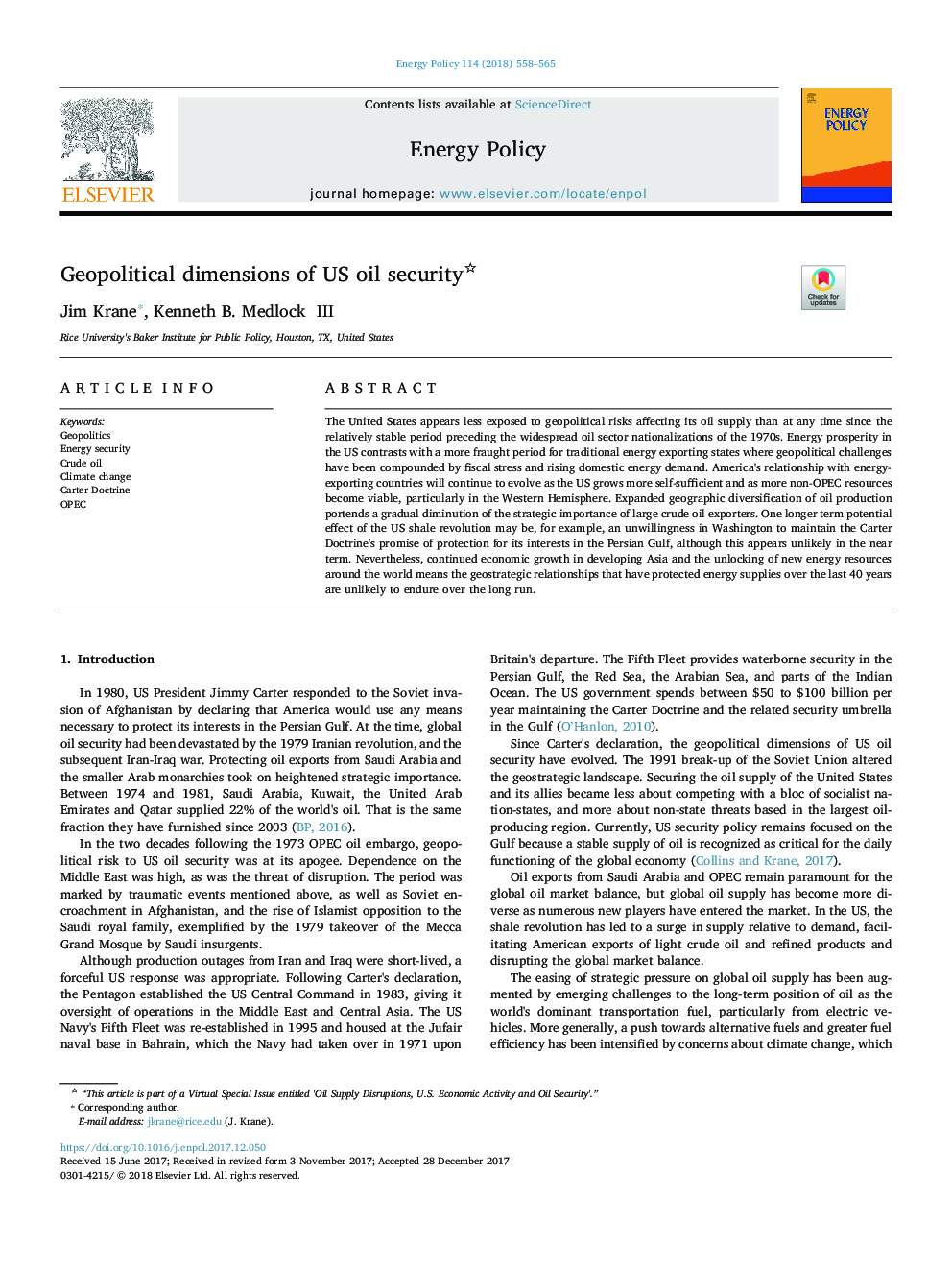| کد مقاله | کد نشریه | سال انتشار | مقاله انگلیسی | نسخه تمام متن |
|---|---|---|---|---|
| 7397705 | 1481244 | 2018 | 8 صفحه PDF | دانلود رایگان |
عنوان انگلیسی مقاله ISI
Geopolitical dimensions of US oil security
ترجمه فارسی عنوان
ابعاد ژئوپولیتیک امنیت ملی ایالات متحده
دانلود مقاله + سفارش ترجمه
دانلود مقاله ISI انگلیسی
رایگان برای ایرانیان
کلمات کلیدی
ژئوپلیتیک، امنیت انرژی، نفت خام، تغییر آب و هوا، دکترین کارتر، اوپک،
ترجمه چکیده
ایالات متحده به نظر می رسد کمتر از خطرات ژئوپلیتیکی که بر عرضه نفت آن تأثیر می گذارد، کمتر از هر زمان دیگری نسبت به دوره پایدار نسبت به ملی شدن بخش های بخش نفت دهه 1970 است. رفاه انرژی در ایالات متحده در مقایسه با دوره ای دیگر برای کشورهای صادر کننده انرژی سنتی، جایی که چالش های ژئوپولیتیک بواسطه استرس مالی و افزایش تقاضای انرژی داخلی مطابقت می کند، متضاد است. رابطه آمریکا با کشورهای صادر کننده انرژی ادامه خواهد یافت، به این ترتیب که آمریکا بیشتر خود کافی رشد می کند و همچنین منابع غیر اوپک به ویژه در نیمکره غربی رشد قابل توجهی می کنند. گسترش تنوع جغرافیایی تولید نفت، کاهش تدریجی اهمیت استراتژیک صادرکنندگان نفت خام بزرگ را نشان می دهد. یک اثر بلند مدت بالقوه انقلاب شیل ایالات متحده ممکن است، مثلا، ناخواسته در واشنگتن برای حفظ وظیفه دکتری کارتر برای حفاظت از منافع خود در خلیج فارس باشد، اگرچه در کوتاه مدت به نظر می رسد بعید است. با این وجود، ادامه رشد اقتصادی در توسعه آسیا و باز شدن منابع انرژی جدید در سراسر جهان به این معنی است که روابط جغرافیایی که منابع انرژی را در طول 40 سال گذشته محافظت کرده اند بعید است در طولانی مدت تحمل کنند.
موضوعات مرتبط
مهندسی و علوم پایه
مهندسی انرژی
مهندسی انرژی و فناوری های برق
چکیده انگلیسی
The United States appears less exposed to geopolitical risks affecting its oil supply than at any time since the relatively stable period preceding the widespread oil sector nationalizations of the 1970s. Energy prosperity in the US contrasts with a more fraught period for traditional energy exporting states where geopolitical challenges have been compounded by fiscal stress and rising domestic energy demand. America's relationship with energy-exporting countries will continue to evolve as the US grows more self-sufficient and as more non-OPEC resources become viable, particularly in the Western Hemisphere. Expanded geographic diversification of oil production portends a gradual diminution of the strategic importance of large crude oil exporters. One longer term potential effect of the US shale revolution may be, for example, an unwillingness in Washington to maintain the Carter Doctrine's promise of protection for its interests in the Persian Gulf, although this appears unlikely in the near term. Nevertheless, continued economic growth in developing Asia and the unlocking of new energy resources around the world means the geostrategic relationships that have protected energy supplies over the last 40 years are unlikely to endure over the long run.
ناشر
Database: Elsevier - ScienceDirect (ساینس دایرکت)
Journal: Energy Policy - Volume 114, March 2018, Pages 558-565
Journal: Energy Policy - Volume 114, March 2018, Pages 558-565
نویسندگان
Jim Krane, Kenneth B. III,
